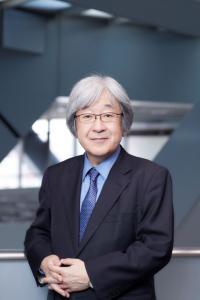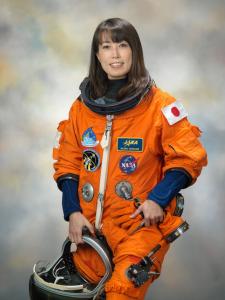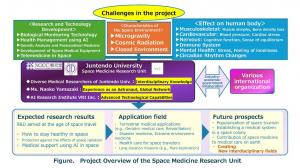Juntendo University Launches Space Medicine Research Unit in Neuron-Glia Crosstalk Center Juntendo
TOKYO, JAPAN, July 7, 2025 /EINPresswire.com/ -- Pioneering a World-leading Fusion of Space Medicine and AI. With Astronaut Naoko Yamazaki and the AI Research Institute VRI on Board, the Initiative Aims to Revolutionize the Future of Medicine through Global Industry-Academia-Government Collaboration.
◆ Overview
In May 2025, Juntendo University (President: Hiroyuki Daida) established a world-leading Space Medicine Research Unit, aiming to pioneer innovation in space medicine through advanced technologies including AI, under the leadership of Advisor to the President Nobutaka Hattori (Director of the Neuron-Glia Crosstalk Center Juntendo, Professor of Department of Neurology).
This unit welcomes Ms. Naoko Yamazaki, a former astronaut of Japan Aerospace Exploration Agency (JAXA) and an experienced International Space Station (ISS) mission specialist, as a Visiting Professor.
Furthermore, the AI medical research institute “VRI Inc.” (Director of Space Projects: Hiromasa Otsuka; Chief Architect: Takeshi Fujita) has joined as a key partner.
Working in collaboration with a wide range of organizations from industry, academia, and government both in Japan and abroad, this new research hub aims to create the next generation of space and terrestrial medicine.
Additionally, the unit brings together the expertise of all clinical departments of Juntendo
University’s School of Medicine promotes a cross-disciplinary approach to generate new insights and medical technologies in the field of space medicine.
◆ Background
In recent years, the acceleration of space development has ushered in an era where many people are now engaging in activities, research, and even daily life in outer space. However, the effects of unique space environments—such as altered gravity and radiation—on the human body remain largely unexplored, and insights gained in this field are expected to contribute directly to future medical innovations.
By integrating the first-hand experience and global network of Visiting Professor Naoko Yamazaki as an astronaut, the technological strength of VRI as a leading AI institute, and the cross-disciplinary collaboration of all clinical departments in Juntendo University, the mission of this unit is to establish new models for medicine and health management that bridge space and Earth.
Moving forward, the unit will actively collaborate with government agencies, industry, and other universities, and domestic and international research institutions to promote open innovation through close cooperation among industry, academia, and government.
◆ Research Focus
The Space Medicine Research Unit brings together top leaders in medicine, engineering, and AI, with all clinical departments participating across their areas of expertise. The unit will advance research and development in the following areas:
Analysis of Space Environment Characteristics
• Microgravity and zero gravity
• Cosmic radiation
• Closed and isolated environments
Effects of Space Environment on the Human Body
• Musculoskeletal system (muscle atrophy, bone density loss)
• Cardiovascular system (blood pressure fluctuations, cardiac load)
• Nervous system (changes in cognition, balance)
• Immune system (abnormal activation or down-regulation)
• Mental health (stress, loneliness)
• Circadian rhythm changes
Space Medical Development through AI and Advanced Technologies
• Biometric monitoring and real-time health data analysis
• Personalized health risk prediction and behavioral optimization using advanced analytical methods, including AI
• Genomic analysis and implementation of personalized medicine
• Development of medical devices for space use
• Establishment of telemedicine platforms for healthcare in space environments
Applications and Societal Implementation
• Application to terrestrial medicine (e.g., elderly care, rehabilitation)
• Disaster and extreme environment medicine
• Health management for space travelers
• Long-duration missions (e.g., Mars exploration)
◆ Prospects
Through the field of space medicine, Juntendo University will integrate the collective expertise of all its clinical departments and, together with a diverse range of partners from industry, academia, and government in Japan and abroad, will lead the field of space and advanced medical technologies.
Going forward, the unit will focus on world-class practical research, utilizing the spaceflight experience and the global network of Visiting Professor Naoko Yamazaki. This will include the social implementation of data-driven and technology-enhanced medicine, the development of medical systems for new environments such as space colonies, and the cultivation of global human resources.
Furthermore, by serving as a hub for co-creation with government agencies, companies, and research institutions, the unit aims to generate innovative outcomes that contribute to the future of both space and terrestrial societies.
Prof. Nobutaka Hattori
Juntendo University
email us here
Legal Disclaimer:
EIN Presswire provides this news content "as is" without warranty of any kind. We do not accept any responsibility or liability for the accuracy, content, images, videos, licenses, completeness, legality, or reliability of the information contained in this article. If you have any complaints or copyright issues related to this article, kindly contact the author above.



